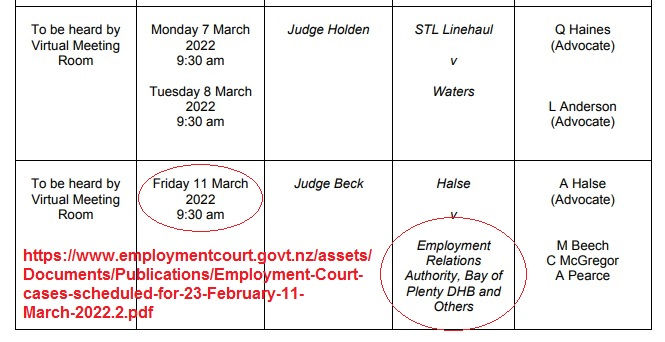“Unless” Order: Defendants want to know exactly what they’re defending – by Lawrence Anderson
- Kim Leighton
- Mar 2, 2022
- 3 min read
Updated: Mar 30, 2022

The Bay of Plenty District Health Board’s claims for penalties and a finding of contempt against Culturesafe New Zealand Limited, Allan Halse and Ana Shaw have been reported by Leighton Associates as being a SLAPP.
A SLAPP is a legal term originating from the United States that is not widely recognised in New Zealand – Strategic Lawsuit Against Public Participation. If Party A attempts to make a claim against a more powerful Party B, Party B uses its financial might to bring a cross claim against Party A which might be without merit but cripples Party A financially through the legal costs he/she incurs defending the cross claim.
The SLAPP against Mr Halse, Culturesafe and Ms Shaw is based on allegations that they are alleged to have obstructed, delayed or prejudiced a proceeding of the Employment Relations Authority by failing to comply with multiple directions which the Authority made during investigating Ms Shaw’s substantive personal grievance claim in 2017/2018. BOP DHB seeks a finding of contempt under section 196 of the Employment Relations Act 2000 plus penalties in terms of section 134A of the Act.
In 2020 the Employment Court heard and resolved a preliminary jurisdictional matter which in its simplicity was whether the Authority could make the directions that it did.
We are now aware of a hearing by Virtual Meeting Room on 11 March at which the defendants will attempt to strike the claims out, seeking an “Unless order”.

The strikeout application, to be successful, will require a high threshold to be met. The principles applying to a strikeout application can be summarised in this way:
1. The facts pleaded in the statement of claim are assumed to be true.;
2. The proceeding must be clearly untenable before it can be struck out.
3. The jurisdiction to strike out is used sparingly and only in clear cases.
4. The jurisdiction to strike out is not displaced by the need to decide difficult questions of law.
Evidence considered in a strikeout application is also limited to what is undisputed. This is because the strikeout application is dealt with on the basis that the plaintiff is able to prove its pleaded facts. The Court of Appeal has acknowledged that there may be cases where a factual allegation is so demonstrably contrary to indisputable fact that the matter ought not to be allowed to proceed further.
If this is done by way of an Unless order then the statement of claim will be struck out if a party does not comply with the order. This often involves cases where there has been a history of failure to comply with Court orders for no good reason. An Unless order, if granted, gives a party one last opportunity to remedy their breach. They are “sparingly used” and only where there has been a “history of failure” to comply with orders.
The scope of this SLAPP has already been reduced by the Employment Court’s decision of a preliminary jurisdictional issue where one of the directions made by the Authority Member was not upheld because it was an interim order that Mr Halse and Ms Shaw were not given notice to respond to. I was in the public gallery to watch the hearing which was held on 29 June 2020 in Auckland.
None of Judge Corkill’s preliminary or interlocutory decisions have commented on the merits of the DHB’s claims.
Ms Shaw’s grievances are seven years old now and now before the Court of Appeal (Judge Smith of the Employment Court dismissed her claim on 4 February 2022).
What has Mr Halse and Ms Shaw done that is so serious that they are now facing penalties and contempt of Authority proceedings? To date there have been no contempt of Authority cases.
If the strikeout application is unsuccessful then we expect that BOP DHB should be directed to particularise their claims in more detail so that at least the defendants will be able to find out what it is that they have been defending for the past three years.
Anyone interested in watching the hearing remotely will have to apply to the Employment Court.
UPDATE 30 March: Health Minister Andrew Little has appointed a Crown Monitor to BOP DHB.



Comments